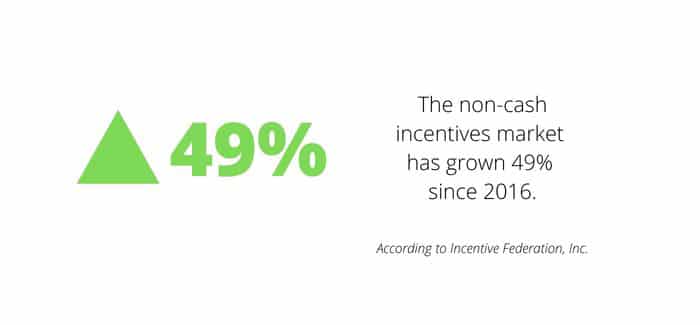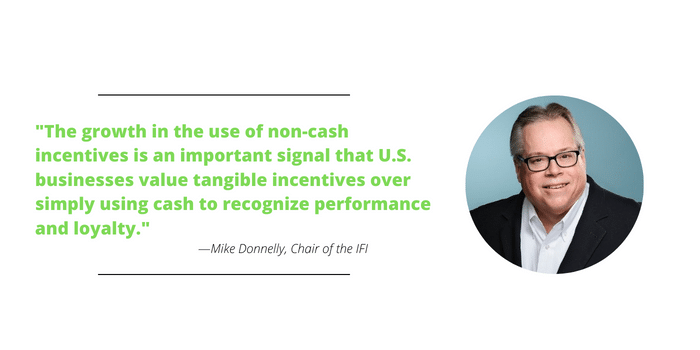U.S. businesses spend approximately $176 billion annually on incentive programs. That figure comes from the Incentive Federation, Inc.’s (IFI) recent 2022 Incentive Marketplace Estimate Research Study, which found 84% of businesses in the U.S. were spending significantly on award points, gift cards, trips and travel, merchandise, and experiential rewards to reward sales staff, employees, channel partners and customers.

Findings:
Since the last market estimate study was conducted in 2016, the non-cash incentives market has grown 49%. The IFI noted significant growth in the various award types across categories and target audiences, and that the number of companies, the incidence of specific reward types used within companies and, in some cases, per company spend have grown since the study was last conducted. Additionally, 92% of companies with revenues of $5 million or more use at least one form of non-cash incentive program.
- Gift cards, including digital gift cards, are most prevalently used in all programs, with award points the second most used in three of four program types.
- Trips and travel are used as rewards in sales incentive programs and channel/distributor/partner programs more often than in the other targeted types.
- Branded merchandise and logoed merchandise are the most prevalent uses for client gifts, which are used in 75% of companies with more than $1 million in revenues.
Most of the businesses in the study—91%—reported revenues from $1 million-$10 million. The study also found:
- Sales incentives account for the largest share of total non-cash incentive spending—30%—followed by employee incentives (23%), customer loyalty incentives (18%), channel/distributor incentives (14%) and corporate gifting (14%).
- Non-cash sales incentives and employee rewards are the most prevalent forms of non-cash incentives, with 55% of businesses using sales programs and 70% of companies having employee programs.
- Non-cash customer loyalty programs are used in 55% of firms, while 48% of companies use non-cash channel/distributor/partner programs.
Another recent study also showed encouraging growth in the corporate gifting market as a whole, which is projected to top $300 billion in the U.S. by 2024.
The Study:
An alliance and umbrella organization of associations and corporations involved in various aspects of the incentive marketplace, the IFI undertakes related research and seeks to educate state and federal governments and agencies, as well as corporations, on the field. This is the third time the IFI has conducted a version of the Estimate Research Study. It sought to determine the strength of the current non-cash incentive market and how much U.S. companies of $1 million or more in annual revenues were spending on non-cash rewards and incentives, among other questions.
- Previous iterations were released in 2013 and 2016.
The IFI conducted the survey in partnership with Rickard Garlick & Associates Consulting and Market Research Services. Data was drawn from a national sample of 1,000 business executives responsible for non-cash incentive programs in companies with at least $1 million in revenues. The study was made possible with major assistance from the Incentive Marketing Association, the Incentive Research Foundation, PPAI and a host of corporate sponsors.
The full results from the Marketplace Estimate Research Study will be released to the public on September 15.

In Their Words:
“This study reaffirms that the use of non-cash incentives has been and continues to be an important part of many businesses’ growth strategies,” says Mike Donnelly, chair of the IFI and president of Hinda Incentives, a Chicago-based incentive solutions provider. “The growth in the use of non-cash incentives is an important signal that U.S. businesses value tangible incentives over simply using cash to recognize performance and loyalty.”
Steve Slagle, the IFI’s managing director, says, “The Federation’s research in 1996 revealed that only 26% of U.S. businesses were using non-cash incentives, and our 2000 research reflected a $27 billion marketplace. The growth in the marketplace over 25 years is certainly gratifying and a tribute to the excellent work by the industry’s companies to educate businesses about the value of all forms of non-cash incentives.”


